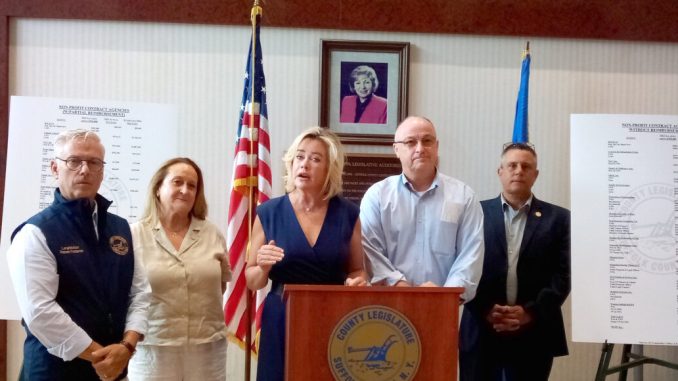
Previously Published in The Messenger
The Suffolk County Legislature is currently deliberating a bill that would cap County subsidies to non-profits if their executives earn large salaries for their work.
County Legislators Trish Bergin (R-East Islip) and Rob Trotta (R-Fort Salonga) discussed their intent at a Sunday press conference held at the William H. Rogers Legislative Building in Hauppauge.
“These agencies set their own salaries, but when they seek County assistance to fund their administrative expenses rather than use those resources towards the programs benefiting our community, it is not fair to the tax-payer,” said Bergin.
The legislative intent for the resolution, I.R.1687-2024, states that the purpose of the law would be to “require that no contract agency shall be eligible for funding if any employee of that agency has a salary greater than the salary budgeted for the Governor of the State of New York.”
The legislative intent also reads that the Legislature “has determined that further restrictions on contract agency eligibility is needed to ensure that County funds are being utilized efficiently in a way that provides the most benefit to the community.”
Governor Kathy Hochul (D) earns $250,000 per year for her service in Albany.
The bill would amend Chapter 189 – Purchasing and Contracts – Article VIII – Guidelines and Requirements for Contract Agencies – of the Suffolk County Code by stipulating the subsidy cap regarding salaries relative to that of the Governor.
The amendment to Article XIII – Evaluation of Contract Agencies by County Departments; Contract Agency Financial Disclosure Requirements – includes definitions in Sections 189-64. The contract agency salary definition would include: “For the purposes of this Article the salary for a contract agency employee, officer, director, or member shall be the sum of the amount provided columns D, E, and F in Part VII of IRS form 990.”
The 990 form is the IRS’ “primary tool for gathering information about tax-exempt organizations, educating organizations about tax law requirements and promoting compliance,” according to the IRS website.
The bill would require each contract agency to complete and submit an online contract agency disclosure form to the State Department of Audit and Control no later than September 15 of each year. Required also would be a list of gifts and/or donations, including the name and address of the entity or individual making the gift or donation. The amendment to Section 189-66 imposed by the bill would require filing of salaries of “every employee, officer, director, or member” of the contract agency applying for County subsidies.
The Messenger discussed the bill’s intent with Legislator Trotta, a primary co-sponsor of the bill.
“What we’re seeing is these non-profits that are supposedly helping people, yet their executives are making $400,000-$500,000 a year,” Trotta told The Messenger. “We just want to direct more of the money to the people they help.”
Trotta called some of the salaries “hideous” for some local non-profits. He specifically mentioned the Long Island Housing Partnership, whose owners rake in a collective $1 million yearly in compensation.
“The people they serve are starving and yet, they live like movie stars,” said Trotta.
When asked about exceptions, Trotta said the bill would not affect contract agencies that work in the healthcare field.
Regarding other exceptions, Trotta said that others can be weighed if the agency can provide a reasoning for their expenses and compensation.
“We’re not opposed to other exceptions if they can justify the costs. It’s really tough to justify half-a-million dollar salaries when you’re feeding homeless people,” said Trotta.
A stipulation of the bill says that 20% of an agency’s budget can’t go to administrative costs, although Trotta says that there can be exceptions to that too on an ad hoc basis.
“Because they’re non-profits, their salaries are online. We want more money to go to their end users,” said Trotta. “If executives are making $150,000, for example, you can feed a lot of people with that money.”
Trotta adds that even with those numbers going into goods and services, it still comes out to an exorbitant amount of money.
“They’re not doing brain surgery,” said Trotta of certain non-profits who would be affected by the legislation, adding that salaries for intensive work and/or large organizations could be justified.
Trotta said that exceptions are being weighed and that suggestions are likely to come through during the public portions on this bill.
We are open to some exceptions, we’re listening to what the non-profits are saying,” said Trotta. “If you’re making money doing something else, and you do this for a little bit, that’s fine. We just don’t want people hiding behind these non-profits to avoid paying taxes and receive government subsidies.”
Bergin and Trotta were joined by Legislators Steve Flotteron (R-Brightwaters), Dominick Thorne (R-Patchogue), and Catherine Stark (R-Riverhead) at Sunday’s press conference. Trotta told The Messenger that Legislator Anthony Piccirillo (R-Holtsville) is warm to the idea and he believes Legislator Tom Donnelly (D-Deer Park) might support it.
“It’s like a tangled web and the aim is to weed out the bad actors,” said Trotta.
Trotta reiterated the possibilities of exceptions and encouraged community input: “Come to us, make your case, and we’ll see what happens.”

